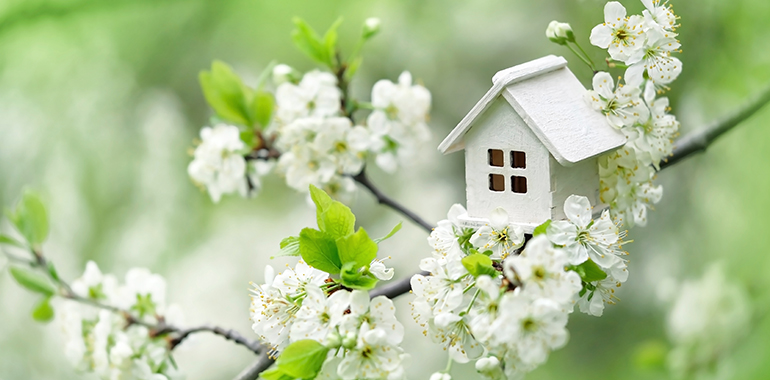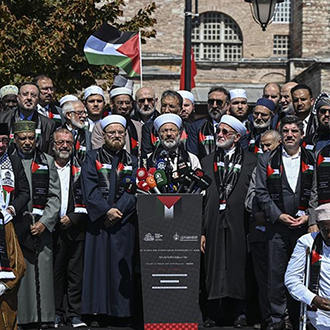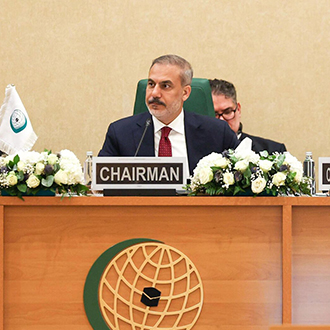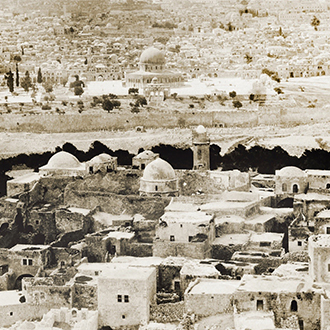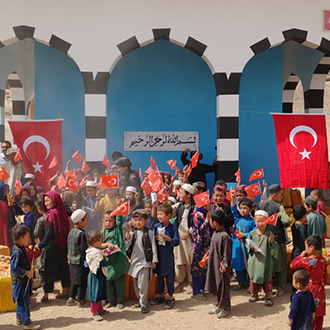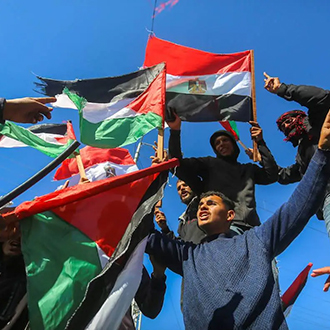Mercy possesses such profound depth of meaning that it resembles a majestic plane tree embracing the entire universe— humankind, animals, plants, and even inanimate objects. Every soul fleeing the scorching heat of violence or the devastating storm of anger finds peace and safety in its shade. As this tree stretches its leaves toward the heavens, it rises upon an unshakable trunk, drawing its strength from the Exalted Creator, “the Most Merciful of those who show mercy.” Is there anyone born devoid of mercy, or is mercy a seed placed innately in every servant’s heart? If the sense of mercy being intrinsic to human, then indeed, it exists from birth. A person is entrusted with the duty of transforming this bestowed sense of mercy from a mere feeling into consistent action. One must nourish the mercy within the heart, reinforce it with every compassionate step one takes, and prevent it from fading away. If a merciful approach is a command of the religion, and being merciful is a form of behavior, then it follows that mercy is a subject of education. Indeed, the first place where a lifestyle rooted in mercy is taught is the family home. The infant who experiences compassion in the embrace of the mother gradually internalizes mercy by observing and adopting the behaviors of both mother and father over time. The more merciful behavior a child witnesses in their surroundings, and the more merciful approaches they observe toward every being in the universe, the more merciful likely to become. For this reason, the presence of mercy among spouses and between parents and children within the family holds utmost importance. Mercy can be transmitted to the new generation — and thereby to the future of society—only through the family. We have said that mercy is like a plane tree. And the one who nourishes the roots of this tree is the Prophet of Mercy, the Prophet Muhammad (saw). Was it not he who introduced mercy to the society of Ignorance, a society that had embraced all the harshness of the desert in their way of life? In a time when barbarism had become a lifestyle, and rudeness and violence were accepted as the language of communication, was it not he who called out to that society, saying: “If you show mercy to those who are on the earth, He Who is in the heaven will show mercy to you.” (Abu Dawud, Adab, 58)
With the mission entrusted to him by his Lord, who declared, “We have sent you (O Prophet) only as a mercy for the whole world.” (Anbiya, 21:107), the Prophet brought mercy to humanity. At times, mercy came to life upon his tongue—he inquired about the well-being of a child’s pet sparrow, gently caressed the cheeks of orphans, embraced his grandchildren tightly, and pressed them to his chest. He joked with them, laughed, played… He kissed and cherished the little ones. When someone, surprised by all this and finding it unusual, said, “We did not kiss or caress our children,” the Prophet’s response was profoundly meaningful: “I cannot put mercy in your heart after Allah has taken it away from it.” (Bukhari, Adab, 18) When we seek to trace the marks of Prophetic compassion within the family, our attention first turn to the relationship between the Messenger of Allah and his wives. It is certainly possible to speak at length about his exemplary family life. However, here we will focus on a few key examples to understand the mindset behind his manner of interaction. During the Hajj journey from Medina to Mecca, the wives of the Prophet (saw) were also part of the caravan. Anjasha, a slave with a beautiful voice who was tasked with guiding the camels, began to recite poetry with great enthusiasm, causing the camels to speed up. The women began to sway and even faced the danger of falling. The intervention of the Messenger of Allah was marked by the utmost grace. His warning was gentle yet profound: “O Anjasha! Drive the camels slowly, as they are carrying glass vessels!” (Bukhari, Adab, 111) What was it that made even a gentle-natured and compassionate companion like ‘Abd Allah ibn ‘Umar say, “During the lifetime of the Prophet (saw), we used to avoid chatting leisurely and freely with our wives lest some Divine inspiration might be revealed concerning us. But when the Prophet (saw) had died, we started chatting leisurely and freely (with them).” (Bukhari, Nikah, 81) This indicates that the Prophet acted outside the prevailing behavioral norms of his time when it came to his treatment of women, showing consistent mercy in his interactions. Moreover, this approach was reinforced by the power and authority of revelation. Just as the Qur’an describes spouses by saying, “Your spouses are a garment for you, as you are for them” (Baqarah, 2:187), the Prophet (saw) likewise emphasized the complementary, unifying, and supportive nature of being a spouse. In fact, this is one of the strongest emphases he made regarding the marital relationship. With an approach that recognizes that spouses possess distinct yet interconnected worlds, neither dissolving into one another nor existing in isolation, he (saw) stated, “Women are the other half who, together with men, complete the whole” (Abu Dawud, Taharah, 94). In his Farewell Khutbah, the Prophet (saw) declared, “Indeed you have rights over your women, and your women have rights over you” (Tirmidhi, Rada, 11), thereby reminding each spouse of the other. Thus, the relationship between spouses must be “reciprocal” and complementary. This is only possible when both partners respect one another’s existence as “human beings”, show compassion and love, and, most importantly, accept the reality of the other. The Messenger of Allah (saw) said, “O people! I advise you to respect the rights of women and to fear Allah in this regard. You took women as a trust from Allah, you made their decency halal (permissible) by making a promise in the name of Allah (marriage)!” His use of the word “trust” when describing a spouse prompts us to reflect on a relationship that neither consumes nor harms the other. Moreover, when we reflect on this statement, it becomes necessary to reconsider a mindset, whether held by men or women, that conflates “protective care” with “ownership” and equates partnership with having unrestricted authority over the other. Indeed, the Prophet’s manner toward his wives clearly demonstrates that he approached them with the same care and delicacy one would show to a trust entrusted by Allah. Another essential pillar of mercy within the family is found in the relationship with children. Rather than elaborating through lengthy examples of the Prophet’s (saw) interactions filled with love and compassion toward children, let us focus on the worldview that underpinned such a relationship. In fact, a single hadith is sufficient to encapsulate the essence of mercy toward children: “He is not one of us who does not have mercy on our young and does not respect our elders.” (Tirmidhi, Birr wa Sila, 15) What was it that made the young servant Anas say, “I served the Prophet for ten years, and not once did he say to me, ‘Uff,’ or ask, ‘Why did you do that?’ or ‘Why didn’t you do this instead?’” (Bukhari, Adab, 39) According to the Qur’an, a child is both a blessing and the light of one’s eyes, but also a trial (Anfal, 8:28). Therefore, to treat a child with patience, tolerance, and mercy is an investment in the future both in the near future, in terms of building a sound society, and in the distant future, in terms of succeeding in the ultimate test. When a person treats their child with cruelty and anger, it is not only the body that is harmed, but far more critically, the soul is wounded. Mercy is a field of education, just as violence is something learned through exposure. Therefore, whether we raise merciful individuals or nurture future oppressors lies largely in our hands. For this reason, we must strive to keep our children away from violence-laden films and computer games. We must introduce them to hearts that carry mercy. We must revive our forgotten traditions, visiting relatives, neighbors, and friends; coming together in times of both grief and joy, and allow our children to experience these customs. We must be the first to water the seed of mercy within their hearts, and also teach them how to water it themselves. Let us teach them, so that the tree of mercy we have nurtured will, in the latter part of our lives, nourish us in return. May our children, those who are expected to spread the wings of mercy over their parents when they grow old, never forget their parents in a corner, never abandon them to nursing homes. Rather, may they pray as the Qur’an teaches: “My Lord! Be merciful to them as they raised me when I was young.” (Isra, 17:23–24). Let us remember mercy in our kinship ties, bonds that today have begun to fade into neglect. We have a Lord who declares: “I am Compassionate, and this has been derived from mercy. I have derived its name from My name. If anyone joins it, I shall join him, and if anyone cuts it off, I shall cut him off.” (Abu Dawud, Zakat, 45) A heart that has not tasted mercy is doomed to rust. A mind that does not place mercy at the foundation of its ideals, thoughts, plans, and programs will, sooner or later, collapse. A body that is not nourished by mercy, not devoted to merciful behavior, will eventually fall victim to its own greed, violence, and oppression—and ultimately, it will perish. How can a society thrive if its veins of mercy have dried up? This is precisely why Islam calls for the universe to be woven, beginning with the individual’s very being, into a network of mercy that spreads outward in everwidening circles. Mercy requires resolve, perseverance, and effort. Let us conclude our writing by seeking assistance in this matter from the Most Merciful of those who show mercy, and by turning to the words of Rumi: “At this (Divine) Portal, we are not weary, so that we should halt everywhere because of the distance of the way. Oppressed in heart and weary is that one (alone) who is in prison through being parted from the Friend. The Heart-ravisher and Desired One is present with us: amidst the largesse of His mercy, our souls are giving thanks.”
